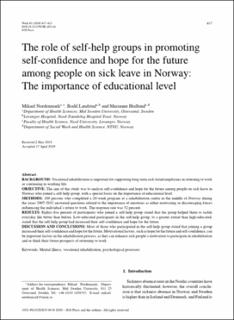The role of self-help groups in promoting self-confidence and hope for the future among people on sick leave in Norway: The importance of educational level
Peer reviewed, Journal article
Accepted version

Åpne
Permanent lenke
https://hdl.handle.net/11250/2712089Utgivelsesdato
2020Metadata
Vis full innførselSamlinger
- Institutt for sosialt arbeid [1365]
- Publikasjoner fra CRIStin - NTNU [37963]
Originalversjon
Work : A journal of Prevention, Assesment and rehabilitation. 2020, 65 (3), 617-623. 10.3233/WOR-203116Sammendrag
BACKGROUND:Vocational rehabilitation is important for supporting long-term sick-listed employees in returning to work or continuing in working life. OBJECTIVE:The aim of this study was to analyse self-confidence and hope for the future among people on sick leave in Norway who joined a self-help group, with a special focus on the importance of educational level. METHODS:109 persons who completed a 20-week program at a rehabilitation centre in the middle of Norway during the years 2007-2012 answered questions related to the importance of emotions as either motivating or discouraging forces influencing the individual’s return to work. The response rate was 52 percent. RESULTS:Eighty-five percent of participants who joined a self-help group stated that the group helped them to tackle everyday life better than before. Low-educated participants in the self-help group, to a greater extent than high-educated, stated that the self-help group had increased their self-confidence and hope for the future. DISCUSSION AND CONCLUSIONS:Most of those who participated in the self-help group stated that joining a group increased their self-confidence and hope for the future. Motivational factors, such as hope for the future and self-confidence, can be important factors in the rehabilitation process, as they can enhance sick people’s motivation to participate in rehabilitation and re-think their future prospects of returning to work.